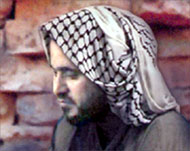Obituary: Abu Musab al-Zarqawi
Abu Musab al-Zarqawi, the leader of al-Qaeda in Iraq, was believed to be behind many of the most headline-grabbing attacks of the conflict in Iraq.

The Jordanian-born fighter rose to prominence as leader of the Islamist Tawhid and Jihad group in 2003.
In 2004, al-Zarqawi announced that he pledged allegiance to Osama bin Laden and changed the organisation’s name to al-Qaeda in Iraq.
The group carried out some of the most deadly attacks in Iraq since the US-led invasion, including the January 2005 bombing of a crowd of police and Iraqi National Guard recruits in the southern city of Hilla that killed 125 people.
Al-Zarqawi is alleged to have personally beheaded at least two American hostages during 2004 – Nick Berg and Eugene Armstrong.
During 2005, al-Qaeda in Iraq began to move their campaign beyond Iraq’s borders – carrying out a suicide attack on a Jordanian hotel that killed 60 people and claiming responsibility for a rocket attack against Israel.
The US put a $25 million bounty on his head, the same as for Osama bin Laden, and al-Zarqawi was sentenced to death three times in his native Jordan.
Exaggeration
His group was also at the centre of the Iraqi sectarian conflict that has threatened to develop into all-out civil war.
Al-Qaeda in Iraq claimed responsibility for the bombing of Shia mosques and al-Zarqawi described Shia Muslims as “enemies of Islam” in an audiotape posted on the internet in June.
 |
|
Al-Zarqawi adopted his radical |
But analysts believe that despite being a prominent figure in the Iraqi uprising, his influence was often exaggerated by the media.
His organisation was believed to be only 3,000 strong at most and US army officials admitted raising al-Zarqawi’s profile by blaming attacks on his group, the Washington Post reported in April.
After reports that he had been dislodged as political leader of the Iraqi uprising, al-Zarqawi released a video in May in an attempt to maintain his profile – a move that may have provided the US with information on his whereabouts.
Criminal
Born Ahmad Fadhil Nazzal al-Khalayla in 1966, al-Zarqawi was known in the Jordanian industrial town of al-Zarqa as a small-time criminal.
He adopted his Islamist radical ideology while in a Jordanian prison in the late 1990s.
After being released in an amnesty, al-Zarqawi went in 1999 to Afghanistan, where he formed links with bin Laden.
He fled during the US-led war that toppled the Taliban government in late 2001, passing through Iran to Iraq, according to US officials.